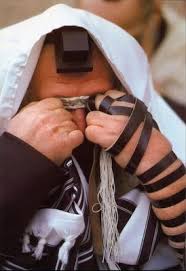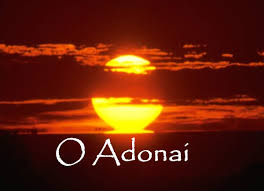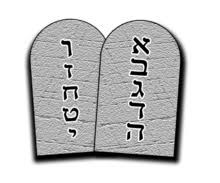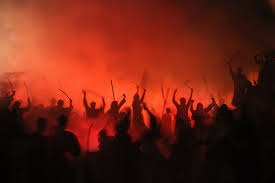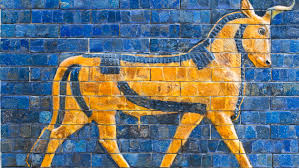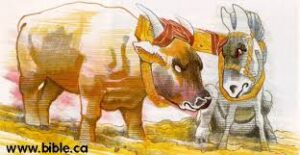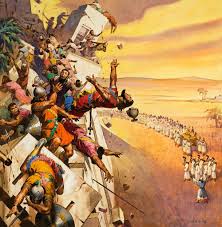Cq – A Blessing and a Curse 11: 26-32
A Blessing and a Curse
11: 26-32
A blessing and a curse DIG: Why is this passage important? How did Moses use Mount Gerizim and Mount Ebal to illustrate the choice set before Beni Yisra’el? What took place on those two mountains? Which path did the northern Kingdom of Isra’el take? What was the result of her choice? What was the significance of Shechem? Bottom line, what did the people need to do?
REFLECT: When have you experienced the blessings of following God’s Word? What helped you obey? Was your obedience willing or reluctant? How so? What “curse” have you or the country you live in experienced as the result of disobedience? What is the lesson in that for you? How would you explain to a new believer the goodness that comes from obeying God?
Parashah 47: Re’eh (see) 11:26-16:17
(to see link click Af – Parashah)
The Key Person is Moshe, speaking to all Isra’el, making a dramatic appeal to choose to obey the commandments of God. A ceremony would later be held between the mountains of Gerizim and Ebal upon entering the Promised Land, during which the consequences of the blessings and curses would be pronounced (to see link click Fd – Blessings and the Curses).
The Scene is in Mo’av, east of the Promised Land, ready to cross over the Jordan.
The Main Events include Moses telling us to see the choice between a blessing and a curse; encouragement to worship God alone, in His designated place; permission to eat meat, but not blood; caution against idolatry and false prophets, the imperative to destroy all the high places; kosher mitzvot, tithes, the seventh year, the sabbatical year (Hebrew: sh’mittah) to cancel debts, providing for the poor, freeing slaves, offering first born animals, and observing three pilgrimage feasts of Pesach, Shavu’ot, and Sukkot.298
A blessing and a curse will result from Isra’el’s obedience or disobedience to the Torah.

The context of this passage is important. It serves as a conclusion to the preceding part of Moshe’s speech (see Bj – The First Address: The General Stipulations of the Covenant) in that it places his audience in a position of decision which will soon have to be made. See, I am setting before you today a blessing and a curse – the Israelites will have to choose. The blessing and the curse, however, are contingent upon their obedience to the mitzvot of the LORD, which are about to be presented to the people (see Cr – The Second Address: The Specific Stipulations of the Covenant).
The doctrine that mankind has free will is considered a fundamental principle in Jewish thought, at least according to some of the Jewish sages. For example, Rabbi Akiva is reported to have said, “Though everything is foreseen by God, yet free will is granted to mankind” (Avot 3:19). Notice the key word in this parashah, re’eh (meaning you see) is singular, whereas the pronoun lifneikhem (meaning before you) is plural. Each Jew is to personally see that the blessings and curses will affect the entire community of Isra’el. This is summed up in the famous dictum: All Isra’el is responsible for one another.
Thus, the passage not only serves as a conclusion to the first address, but also as a chiastic framework to what follows, which sets the subsequent chapters with their immediate and proper perspective. The framework for which the blessing and curse can be seen in the Torah is as follows:
A. The blessing and curse in the present renewal of the covenant (11:26-28).
B. The blessing and curse in the future renewal of the covenant (11:29-32).
C. The Specific Stipulations of the Covenant (12:1 to 26:19).
B. The blessing and curse in the future renewal of the covenant (27:1-26).
A. The blessing and curse in the present renewal of the covenant (28:1-69).
Dear Holy and Loving Heavenly Father, Your love is wonderful and living in a land that has been blessed by You in so many ways, often people want the blessings – without obedience. But You promised both blessing and curses. May the world awaken to see that blessing is not always guaranteed. Salvation cannot be grabbed and held onto while holding on to sin. God in mercy offers salvation as a free gift. For by grace you have been saved through faith. And this is not from yourselves – it is the gift of God. It is not based on deeds, so that no one may boast (Ephesians 2:8-9).
You are 100% pure, a God who never does anything wrong and who cannot tolerate even the slightest sin. Though You, God, would love to bestow salvation on all, You can only present the gift to those who in faith choose to love and follow Yeshua as Savior. For if you confess with your mouth that Yeshua is Lord, and believe in your heart that God raised Him from the dead, you will be saved. For with the heart it is believed for righteousness, and with the mouth it is confessed for salvation (Romans 10:9-10). Confessing You as Lord means more than saying your name with Lord as the first word. Choosing to lovingly obey all You ask of me, makes You my Lord. Too often people want to be Lord of themselves and do whatever pleases them, but You make the best Lord – for Your love is perfect. I love You and want to obey You as my Lord. In Yeshua’s holy name and power of His resurrection. Amen
For the first time in Deuteronomy, Moses uses the technical terms of the covenant, blessing and curse. Ancient Near Eastern treaties generally included a section promising blessings and threatening curses depending upon the faithfulness of the vassals (see Ah – The Treaty of the Great King) to their covenantal commitments. He declared: See, I am setting before you today a blessing and a curse – the blessing, if you listen to the mitzvot of ADONAI your God that I am commanding you today, but the curse, if you do not listen to the mitzvot of ADONAI your God, but turn from the way I am commanding you today, to go after other gods you have not known (11:26-28). Moses knew he was not going into the Promised Land with the people (see Ax – Moshe Pleads), but here he uses the example of these two mountains to show them the importance of obeying ADONAI. Two paths lie ahead. But only one path would lead to long life in the Land.
After arriving in the Promised Land, the Israelites were to rededicate themselves to the covenantal agreement by proclaiming these blessings and cursings while standing on Mount Gerizim and Mount Ebal. Now when ADONAI your God brings you into the Land you are going in to possess, you are to set the blessing on Mount Gerizim (meaning cutting off from the things of this world), to the south, covered with fertile vegetation, and the curse on Mount Ebal (meaning bear or empty there was nothing there), to the north, which was barren (11:29).299 When they reached these two mountains, the scene was very moving (Joshua 8:30-35). Half of the tribes would stand on one mountain, and half the tribes stood on the other, with the Levites in the middle. The shouting of the blessings and the cursings of the Levites could be heard from each side of the valley. A mile separated Mount Gerizim from Mount Ebal. But it is interesting to know that the spot chosen by God for this reading is a vast natural amphitheater, in which the human voice can be heard at a surprising distance. About half-way between Shechem and the mouth of the valley in which it stands there is a deep, semicircular recess in the face of Mount Ebal, and a corresponding one precisely opposite to it in Mount Gerizim.300 Therefore, the people were shown the importance of obeying ADONAI, and the curse that would come about if they did not obey.
Shechem was the place that marked the downfall of the northern kingdom of Isra’el. Rehoboam, son and successor of King Solomon, went to Shechem to be crowned king of all Isra’el. But he actually ended up dividing the Kingdom into the northern kingdom of Isra’el and the southern kingdom of Judah. Shechem would later become the first capital of the Northern Kingdom. It was unfortunate that Isra’el would choose the curse of Mount Ebal (First Kings 12:25-33).301
Are they not across the Jordan toward the west, in the land of the Canaanites who dwell in the Arabah – the mountains extended over a wide range, and so the part chosen for the blessing and cursing is specified as opposite Gilgal, beside the oaks of Moreh (Genesis 12:6, 35:4; Joshua 24:26; Judges 9:6)? For you are about to cross over the Jordan to go in to possess the Land ADONAI your God is giving you – you will possess it and dwell in it, and you will take care to do all the statutes (Hebrew: hachukkim, meaning to write into law permanently) and ordinances (Hebrew: hammishpatim, meaning a judgment of the court) that I am setting before you today (11:30-32). The lengthy section which began at 5:1 now comes to a close. Isra’el is about to cross the Jordan and take possession of the Land of Promise. Since, in the final analysis, success in the undertaking will depend on obedience, Moshe’s closing message to Isra’el was to be careful to carry out all the statutes and ordinances that he had set before the people.302
Spiritually speaking, believers today live between two mountains: Mount Calvary, where Yeshua died for us, and the Mount of Olives, to which Messiah will return one day (Zechariah 14:4; Acts 1:11-12). But, ADONAI hasn’t written the Ten Words on stones and warned us about curses; rather, He has written His B’rit Chadashah on our hearts (see the commentary on Jeremiah Eo – The Days are Coming, declares the LORD, When I Will Make a New Covenant with the People of Isra’el) and blessed us in the Lord (Second Corinthians 3:1-3; Hebrews 8; Ephesians 1:3). Therefore, there is no condemnation for those who are in Messiah Yeshua (Romans 8:1). God’s dispensations change, but His principles never change, and one of those principles is that He blesses us when we obey, and disciplines us when we disobey (see the commentary Hebrews Cz – God Disciplines His Children). As we walk in the power of the Ruach Ha’Kodesh, we overcome the appetites of the flesh, and God’s righteousness is fulfilled in us (Romans 8:4), and we will never hear the voices from Mount Ebal.303




